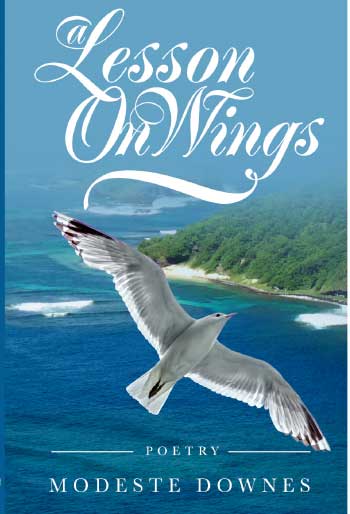WHAT a bundle of poems!
The bundle starts and ends with death and the futility of all things human, “the scythe’s indiscriminate hacking” ever-present.

To me, the famous biblical cry of: “Oh Death, where is Thy Sting? Oh Death, where is Thy Victory?” – although beautiful and much-quoted at memorial services – always seems a little misplaced. After all, Death clearly does have the last word, the final sting, the ultimate victory.
But along trundles Modeste Downes, performing a deft judo-move on Death: admitting from the get-go, and right throughout his new book A Lesson on Wings, that man is powerless in the face of death, in the face of eternity. “Ash to ash, dust to dust”.“…even his thoughts perish”. “Come at breakneck speed or dive like a meteor. Either way you lose”.
Downes sums up all of (wo)man’s best efforts in life’s three damning verbs: ‘To flower, to suffer, to die”.
And yet!
In his poetry, Downes paints the black hole of futility by painting its outlines, its circumferences. The essential futility of life’s efforts is not challenged, not denied. But it is made visible by contrast: by intimate, tender observations of love, nature and history.
Downes’ poetry ranges wide and far. It takes in current affairs in the Middle East, the vagaries of the tourism industry, the imminent threat to the planet by global warming, the legacy of slavery. Downes also explores themes so close to us that we have been barely conscious of them, until we read about them through his eyes. The immediacy of his description of Vieux Fort town in the poem “Clarke Street” strikes like lightning.
“(the) legendary hill with the cross,
where the priest shook his sandals
and a town is forever cursed;
the misnomer ‘Commercial Street’
…
The Mangue that stifled with rage,
till Shine Drive opened a vent
to see through Beane Field and Bruceville,
a saunter ‘cross New Dock Road
…
Halved like A.D. and B.C.,
all’s east, or west of Clarke Street.”
Downes is a master of the craft that builds narrative tapestries. “Watch these words unfold”, he warns. And unfold they do.
His descriptive imagery is sometimes complex and winding, sometimes so direct it makes you feel there exists simply no other way to describe the thing described:
“A red flamboyant in blossom
is an arrogant creature.
It holds its basin of blood
in mid air for a show,
until it sheds it all,
like a crucified Christ,
drop by redeeming drop,
its petals a red pool,
smearing the ground at its feet.”
He does nostalgia as well as Walcott.
“Me, I from anudda age, poupa Jesus!
I born when a house was ajoupa
tile and galvanize didn’t invent yet;
tèsson was stove
pressure cooker was kanawi”
But beware: his poems are far more than an ode to the sunset at Black Bay, the sea views from that “awesome perch” Moule a Chique, the magical high of smoking dope on Mount Gimie or ‘the Time of the Americans’ in Vieux Fort.
Downes is not afraid to punch nostalgia in the nose:
“ I laugh every year
when October come
seeing dem same youth
hustling dey granma
to view and sample
de same old things
dem jeer at and criticize
making me feel old and stupid.”
Downes’ use of language is impressive. His knowledge and vocabulary are wide-ranging and his easy blend of Kweyol, Latin, ‘high’ English and profanity works like a dream.
The poet is at times philosophical, spiritual, and full of love – at other moments cold-eyed analytical, cynical, lonely and melancholic. He embraces the entire palette of emotions and finds words to embody them all.
But, to me, the biggest surprise was to see how Downes is brilliant in his anger. Here is a man who, by all appearances, has no difficulty living up to his given name of Modeste. A man who is polite, physically unassuming, easy to miss in a crowd. But Modeste Downes angry is like the Lion of Zion breathing fire. Listen.
I am finished, absolutely finished.
Finished with all this imbecility
all this kiss-arse genuflecting for attention
this obsolescent kiss-and-make-peace pantomime
this charade of engineered mamaguism
this tyranny of servant over master
this defaulting on dismantled promises
void of sincerity in the first place
this load of copain-copine incestuousness
on the altar of favouritism
I am through, absolutely finished.
Done with your copulatory work regime
your duplicate-pay-packet nepotism
your dim transparency of ‘anba tab-ism’
your highfalutin découché speechifying
—spectator bullshit-ism in fancy attire—
your inveigling, copious Houdinic crap in the House
when so many homes barely pass the test for houses
And so on. In nine verses of pure, unadulterated fed-uppedness, Downes lets them have it good and proper. All the partisan business, the pissing in people’s eyes and calling it rain, the racism, the hypocrisy and the disrespect.
“I am finished, unrepentantly finished.
I am finished, I too am done with caring
whether you like me or hate my poetry
I will not compromise art for patronage
the lean sheep survives though summer grass be brown.”
In the end, he turns to self-reliance.
“I cling to poetry, alone faithful in all seasons.”
You cannot get more St Lucia-in-your-face than this.
It is a brilliant collection of poems.
Buy it.
Read it.
Share it.
(Dr. Jolien Harmsen has published several books, including Rum Justice, a novel and more recently co-authored A History of Saint Lucia)


![Simón Bolívar - Liberator of the Americas [Photo credit: Venezuelan Embassy]](https://thevoiceslu.com/wp-content/uploads/2025/12/Simon-Bolivar-feat-2-380x250.jpg)






